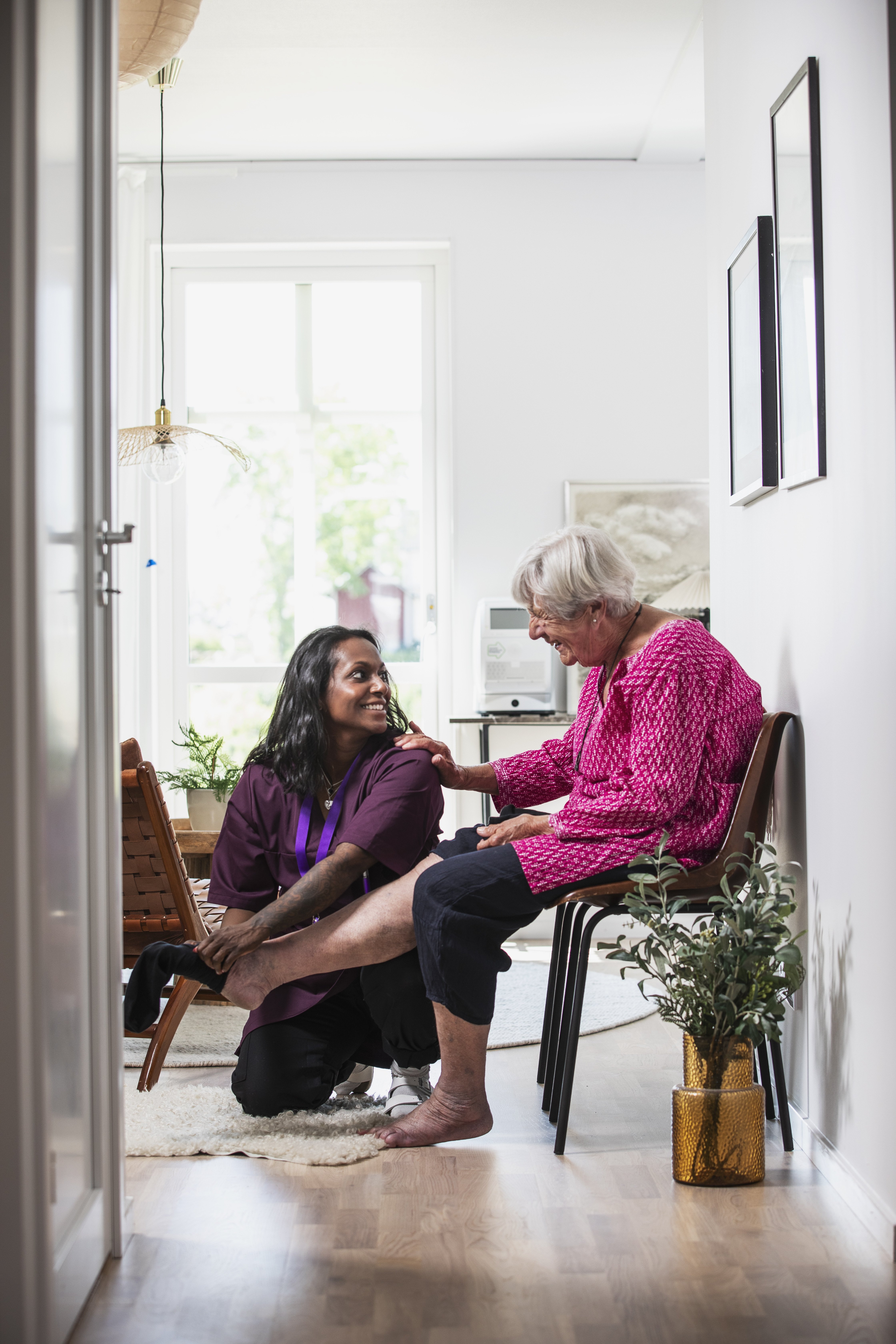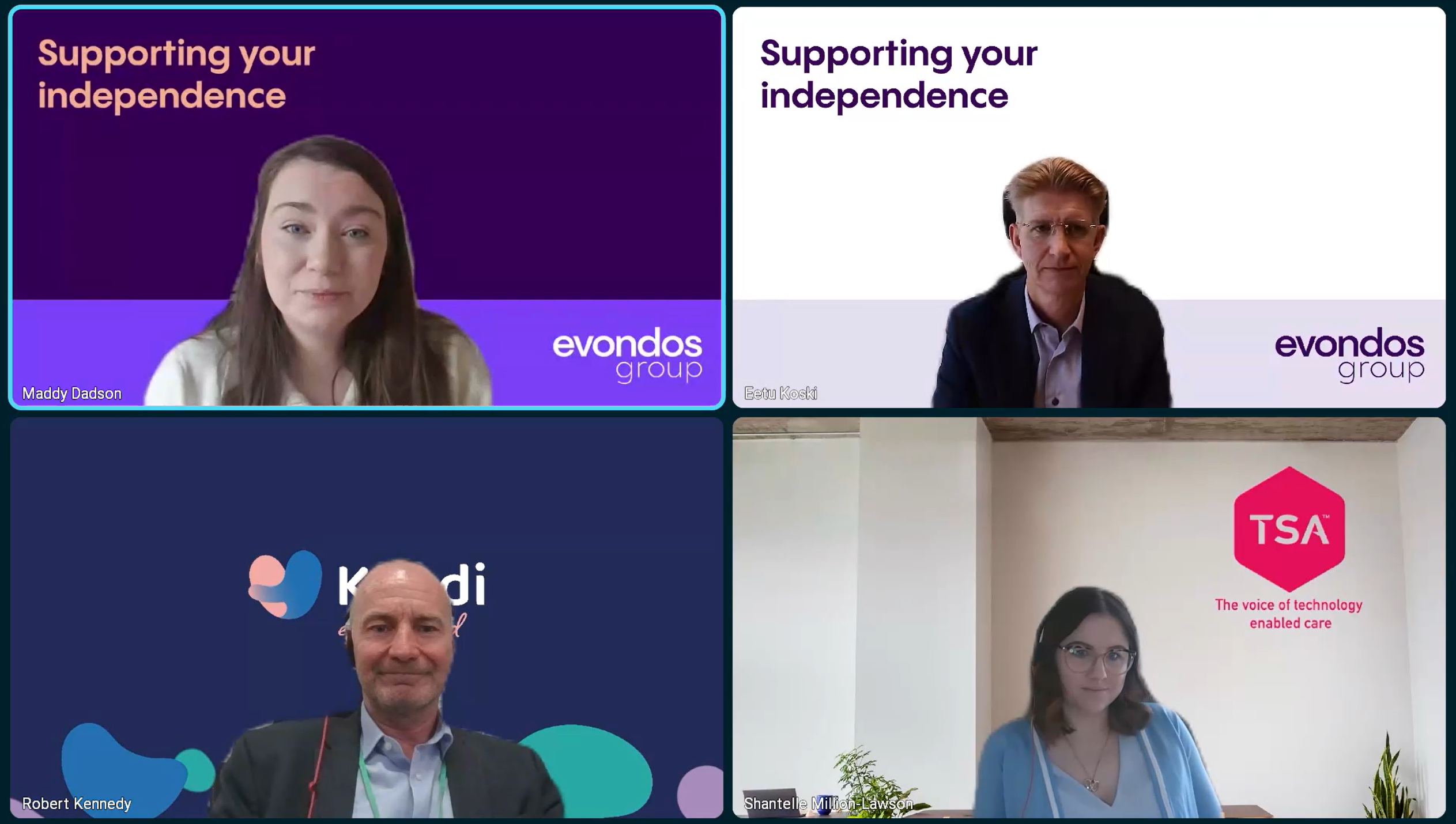The Role of Medication Management in Enhancing Independence and Reducing Costs
By Evondos on 10 Jul 2025

Real-life Impact Case Studies in South East England by Kyndi
About Kyndi
Kyndi is a Local Authority Trading Company based within the health setting, owned by the Medway Council, and operates across Medway and South East regions of England. Kyndi is acting as a bridge between the health funding and the social care funding as they manage endto-end health care. This means that they take care of people in a comprehensive way with the help of a multidisciplinary team. As Kyndi is involved from physical care at the Medway hospital, to the patients medication management and to care calls at home, they are in a unique position to handle and solve challenges that both sectors are facing. One of Kyndi’s key activities, include providing assitive technologies such as the Evondos automated medicine dispenser, to support residents to overcome their individual challenges.
Challenges Kyndi face
- Pharmacists increasingly refuse to fill dosset boxes
- Pharmacists can only hold a limited amount of medication
- Safe-guarding of medications
- Cost of care calls are increasing
- Cost of hospital admissions due to non-adherence are increasing
Implementation of Evondos
By introducing the Evondos system, Kyndi can support people being discharged from the hospital sooner and enable individuals to maintain their independence at home for longer. The Evondos automated medicine dispensing service enhance users’ safety, independence, and health from the comfort of their homes. Kyndi launched the Evondos service by making it available to residents in the area since autumn of 2024 and the collaboration is planned to continue until the spring of 2026.
Key features of Evondos that Kyndi appreciates:
- Automated Reminders
The medication dispensing robot reminds users when it's time to take their medication - Remote Monitoring
Care providers can monitor the robot’s activity and refill it with medication, ensuring safety at all times - Locked Medicine Cabinet
Acts as a secure storage when medication is not to be taken and when the dose is missed
- Travel Mode
Possibility to take medicine pouches on-the-go, making life even more independent - Valuable Guidance
Provides important instructions for medication intake
Results so far
Improved sense of independence for the users. They do not need to wait around for care staff, who might be late, but can rather live their life on their own accords. Medication adherence for people that started using Evondos has been increased from 40% to 90%. Now that the GP’s prescriptions get sent straight to the pharmacists, where the hygienic and convenient dose pouches are made and no one else has to handle individual pills or tablets, the risk of human error and medication incidents is decreased substantially.
Estimated savings
In addition to beforementioned results, Kyndi has also notices the decreasing need for care calls and hospitalizations. Kyndi has calculated the following estimated annualised savings across their test user group of 5 persons in costs for both health and social sectors:
Care call savings = £72,000
Savings from prevention of re-admissions, ambulance calls and treatment = £40,000
Case study #1
From serious hospitalizations to stability and independence
Client: Anthony D
Age: 75
Location: Medway, UK
Assistive Technology Used: Evondos® Automated Medication System
Anthony D lives independently at home, is mobile, and manages his activities of daily living without assistance. The major concern was his lack of adherence to his medication. Anthony was admitted to hospital with an infection, delirium, and an exacerbation of his diabetes, all of which had caused an increase in the number of falls he was experiencing. Once stabilized, Anthony was able to return home with a twice-a-day single-handed care call to manage his medication.
Intervention
In September 2024, Anthony was introduced to the Evondos® Automated Medication System by Kyndi. This system, combined with a monitoring service, was set up to manage his medication schedule, ensuring he takes the correct doses at the right times. The system dispenses the medication through barcoded pouches that are released when medication is due.
Impact Measurement
1. Health Outcomes
Medication Adherence: Increased from 50% to 100%
Hospital Admissions: No admission since system installed
2. Quality of Life
Independence: Anthony reports a significant increase in his sense of independence and confidence in managing his health. He no longer needs to wait in for carers and can now plan activities without worrying about having to stay in for visits.
Mental Health: Improved mental well-being, with reduced anxiety about medication management.
Daily Routine: Enhanced ability to maintain a regular daily routine without the need for constant reminders from caregivers.
3. Economic Impact
Pre-intervention
Hospital admissions: £200 ambulance + £450 x 5 night stay = £2,450
Care calls: £30 x 7 = £210 x 52 = £10,920 = £13,370
Post-intervention = £0
Cost of Assistive Technology (Evondos®) and monitoring = £2,000
Net Savings: £13,370 - £2,000 = £11,370 savings per year
4. Social Impact
Caregiver Burden: Reduced by 60%, allowing family members more free time and reducing stress and concern about hospital admissions caused by non-adherence to medication.
Community Engagement: Anthony is now able to continue with his love of going to watch Charlton FC.
Case study #2
From late medicine administration causing anxiety to improved mental health and medication adherence
Client: Mr Peter C
Age: 81
Location: South East, UK
Assistive Technology Used: Evondos® Automated Medication System
Peter, 81, is a gentleman who is a long-term transplant patient with dementia and diabetes. He had previous assistance of 4 single-handed care calls per day to ensure that the vital medication regime was adhered to. This caused Peter great stress when carers were unavoidably late and restricted Peter’s independence and affected his mental wellbeing.
The implementation of the Evondos System has shown substantial benefits for Peter, both in terms of health outcomes and economic savings. The data provided enabled the care calls to be removed entirely. Peter’s enhanced sense of independence and reduced anxiety have led to a higher quality of life. The ability to maintain a regular daily routine and do what he wants without need to wait in for carer visits together with the removal of the anxiety if the carers were delayed has greatly helped Peter.
Intervention
Kyndi was contacted by the Community team at Medway Community Health Care to see if they could support Peter. Following a review of medications and discussions with their pharmacy partners, they were able to utilise the Evondos® Automated Medication System despite the very large regime.
Impact Measurement
1. Health Outcomes
Mental Health Impact: Peter’s low mood in early July has completely gone now that he no longer has to rely on others for his medication
Medication Adherence: Increased from 60% to 100%
Hospital Admissions: No further risk of hospital admissions as the threat of infections to the transplant has been removed.
2. Quality of Life
Independence: Peter utilises the robot without the need to wait for carers to attend to support his medication.
Mental Health: Improved mental well-being, and improved self esteem as Peter is now able to plan his days without reliance on care calls.
Daily Routine: Enhanced ability to maintain a regular daily routine without the need for as much intervention.
3. Economic Impact
Pre-intervention
4 x care calls per day were annualised at = £6,240
Post-intervention = £0
Cost of Assistive Technology (Evondos®) and monitoring = £2,000
Net Savings: £6,240 - £2,000 = £4,240 savings per year
4. Social Impact
Caregiver Burden: Peter’s niece is the main care giver and she reports that time spent with Peter is more about Peter now rather than worries of medication and having to ensure that all of his medication has been taken on time. She no longer has any concerns with him overdosing on his cocadamol for pain relief. Peter is overjoyed with the results and the equipment and his niece has asked to record the following for him;
“I would like to say thank you for changing Peter’s life by having the Evondos machine. Before having this, Peter was reliant on having carers to give him his medication. Even though we told them he needed to take his tablets at the same time every day, they continued to turn up 2 hours late each day. This caused a lot of unnecessary stress and frustration for us and for Peter. The Evondos has changed his life; it has given him back independence and control to take his medication in a safe environment. He is no longer frustrated and angry waiting for carers that never turned up. When anyone visits Peter, he is always telling everyone how amazing the machine is and how easy it is to use.”
Sources: Kyndi (Medway, UK). 2024-2025. Impact Case Studies. The Role of Assistive Technology in Enhancing Independence and Reducing Costs.
For more information please contact:
Kyndi: Rob.Kennedy@Kyndi.co.uk
Evondos Group: Phillipa.Leigh-Collyer@Evondos.com
You May Also Like
These Related Stories
/2022%20Salto%20Group/salto.jpeg)
Evondos and Group Saltó signed a frame agreement for health robotics cooperation in Spain

Navigating Healthcare Redesign: A Journey Towards Autonomy and Well-being
